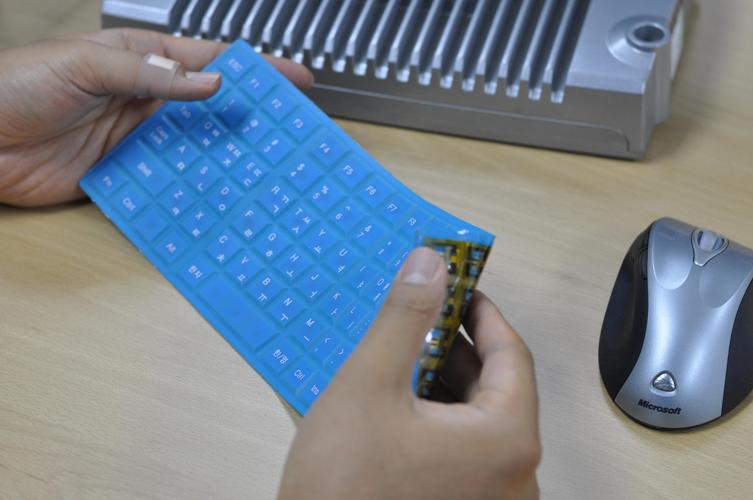people
The KAIST Institute for Information Technology Convergence (KIITC) has developed the next generation keyboard that does not need power and wires.
The powerless/wireless keyboard developed by KIITC is flexible, foldable, portable, and compact, making the possession of keyboard easier and more convenient.
The idea of this technology was derived from "Idea Contest for Future Device" opened by KIITC in 2007, and Future Device Team (Team Leader: Dr. Sungkwan Jung) of KIITC embodied the idea and developed full-flexible powerless/wireless keyboard by using the passive Radio Frequency Identification (RFID) technology to support the convenient data input for daily mobile life.
Through the technology, KAIST expects to realize ubiquitous computing and communication environment, open a new market for foldable keyboards, and secure the competitiveness of mobile devices industries in the world market.
KIITC has also successfully transferred the technology of powerless/wireless keyboard to Hanyang Demitech for commercialization.

-
research KAIST Develops AI That Automatically Designs Optimal Drug Candidates for Cancer-Targeting Mutations
< (From left) Ph.D candidate Wonho Zhung, Ph.D cadidate Joongwon Lee , Prof. Woo Young Kim , Ph.D candidate Jisu Seo > Traditional drug development methods involve identifying a target protin (e.g., a cancer cell receptor) that causes disease, and then searching through countless molecular candidates (potential drugs) that could bind to that protein and block its function. This process is costly, time-consuming, and has a low success rate. KAIST researchers have developed an AI model th
2025-08-12 -
research “One Experiment Is All It Takes”: KAIST Team Revolutionizes Drug Interaction Testing, Replacing 60,000 Studies
A groundbreaking new method developed by researchers at KAIST and Chungnam National University could drastically streamline drug interaction testing — replacing dozens of traditional experiments with just one. The research, led by Professor Jae Kyoung Kim of KAIST Department of Mathematical Sciences & IBS Biomedical Mathematics Group and Professor Sang Kyum Kim of Chungnam National University's College of Pharmacy, introduces a novel analysis technique called 50-BOA, published in Natu
2025-06-16 -
research “For the First Time, We Shared a Meaningful Exchange”: KAIST Develops an AI App for Parents and Minimally Verbal Autistic Children Connect
• KAIST team up with NAVER AI Lab and Dodakim Child Development Center Develop ‘AAcessTalk’, an AI-driven Communication Tool bridging the gap Between Children with Autism and their Parents • The project earned the prestigious Best Paper Award at the ACM CHI 2025, the Premier International Conference in Human-Computer Interaction • Families share heartwarming stories of breakthrough communication and newfound understanding. < Photo 1. (From left) Professor Hw
2025-05-19 -
event Dongwon Group Honorary Chairman Kim Jae-chul Donates a Total of 54.4 Billion Won to KAIST
- Dongwon Group Honorary Chairman Kim Jae-chul, following his 2020 donation of 50 billion won, donates an additional 4.4 billion won to strengthen the AI education and research infrastructure - The additional donation of 4.4 billion won will be used to build a new AI education and research building - “In the AI era, there will be a new future in the sea of data. Please become the world’s No. 1 research group.” - Honorary Chairman Kim Jae-chul < Photo 1. Kim Ja
2025-01-06 -
event KAIST to begin Joint Research to Develop Next-Generation LiDAR System with Hyundai Motor Group
< (From left) Jong-Soo Lee, Executive Vice President at Hyundai Motor, Sang-Yup Lee, Senior Vice President for Research at KAIST > The ‘Hyundai Motor Group-KAIST On-Chip LiDAR Joint Research Lab’ was opened at KAIST’s main campus in Daejeon to develop LiDAR sensors for advanced autonomous vehicles. The joint research lab aims to develop high-performance and compact on-chip sensors and new signal detection technology, which are essential in the increasingly compe
2024-02-27